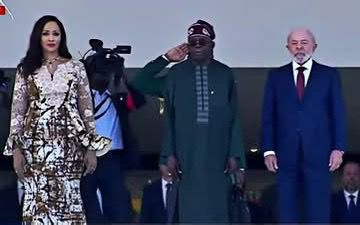In the unfolding narrative of Nigeria’s global reawakening, President Bola Ahmed Tinubu’s state visit to Brazil stands as a luminous chapter—one that repositions Nigeria not merely as a participant in global affairs, but as a co-architect of South–South cooperation and strategic realignment.
This is not diplomacy as usual. It is a deliberate recalibration of Nigeria’s foreign policy—anchored in historical depth, economic ambition, and cultural kinship. Brazil, with its vast population of African descendants and its shared colonial legacy, offers Nigeria a mirror and a partner. The visit reactivates centuries-old ties and transforms them into instruments of modern progress.
A Reception Fit for a Global Statesman
President Tinubu’s arrival in Brasília was met with a level of ceremonial grandeur rarely extended to visiting African leaders. Brazilian President Luiz Inácio Lula da Silva orchestrated a full-spectrum state welcome that blended military precision with cultural reverence. A majestic parade of armored vehicles and elite military hardware rolled past the presidential palace, flanked by honor guards in full regalia. Fighter jets soared overhead in synchronized formation, painting the sky with the colors of Brazil and Nigeria—a symbolic gesture of unity and shared destiny.

The Brazilian National Anthem was followed by a stirring rendition of Nigeria’s anthem, performed by a joint military band, while dignitaries and cultural icons from both nations stood in solemn respect. A 21-gun salute echoed across the capital, underscoring the weight of the occasion. The ceremonial exchange of gifts included rare Afro-Brazilian artifacts and a handcrafted emblem of the Yoruba-Brazilian heritage—signaling not just diplomatic warmth, but ancestral homage.
This was not a routine protocol—it was a tier-one diplomatic embrace, rich in symbolism and strategic intent. It elevated Nigeria’s stature, celebrated its cultural legacy, and signaled to the world that Brazil sees Nigeria not as a peripheral partner, but as a pivotal force in global affairs.
Elevating the Language of Engagement
Since assuming office in May 2023, President Tinubu has embarked on a series of high-level sovereign engagements—each one a strategic overture, not a ceremonial detour. These include France, China, St. Lucia, and now Brazil. These are not mere “state-level engagements”—they are presidential overtures of consequence, designed to restore Nigeria’s credibility, attract capital, and forge new axes of influence.
Tangible Gains from Brazil: Beyond Symbolism
President Tinubu’s visit to Brazil yielded two immediate and strategic outcomes:
Direct Air Connectivity: Nigeria and Brazil signed a Bilateral Air Service Agreement (BASA), paving the way for direct flights between Lagos and São Paulo. This breakthrough will reduce travel time from two days to seven hours, slash logistics costs, and open new corridors for trade, tourism, and cultural exchange.
Agricultural Transformation: Brazil committed to a $2.5 billion investment in Nigeria’s livestock and agribusiness sector, including the delivery of 10,000 tractors and 50,000 farm implements for local assembly. This builds on the Green Imperative Programme and positions Nigeria to learn from Brazil’s global leadership in mechanized agriculture.
Additionally, Air Peace signed an agreement with Brazilian aircraft manufacturer Embraer to establish a world-class Maintenance, Repair, and Overhaul (MRO) facility in Lagos—serving not just Nigeria, but the entire African continent.
Rebutting the Critics
Peter Obi’s critique of Tinubu’s foreign trips—framed as excessive and insensitive—deserves scrutiny. While democratic accountability is essential, the outcomes of these visits speak for themselves. From resolving visa bans to securing billions in foreign direct investment, Tinubu’s diplomacy has been strategic, not escapist.
To dismiss these engagements as frivolous is to ignore the architecture of modern statecraft. Nigeria’s re-entry into the corridors of global influence requires presence, persuasion, and partnership.
A New Axis of Possibility
The Brazil visit is not just a bilateral success—it is a signal. Nigeria is forging a new axis of cooperation with Latin America, rooted in shared history and mutual ambition. It is a quest not for prestige, but for purpose.
This is Nigeria’s return to the pinnacle of international diplomacy—not as a supplicant, but as a sovereign partner with something to offer and something to gain.
Stay ahead with the latest updates!
Join The Podium Media on WhatsApp for real-time news alerts, breaking stories, and exclusive content delivered straight to your phone. Don’t miss a headline — subscribe now!
Chat with Us on WhatsApp





